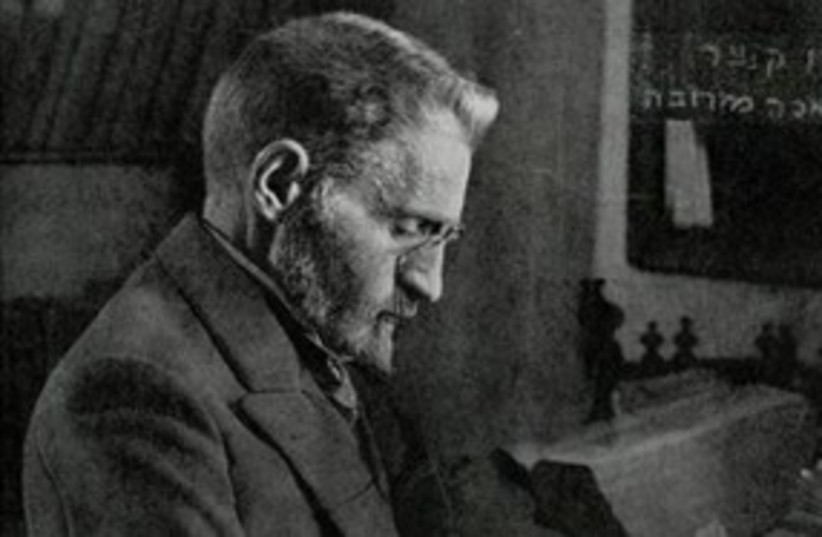Eliezer Ben-Yehuda, the father of modern Hebrew, would probably get sick if he went to an Israeli hospital.
According to an article in the latest issue of the Hebrew-language journal Harefuah, doctors and nurses in the Jewish state prefer using universal or slang names for many medical terms instead of their given Hebrew names.
Prof. Avi Ohry of Tel Aviv’s Reuth Medical and Rehabilitation Center and Tel Aviv University, and Dr. Atzmon Tsur of Meuhedet Health Services’ northern district write that medicine and the doctors and nurses who practice it are a conservative bunch. Many of them also were born or studied abroad, so they are not likely to memorize the names of objects and terms used daily into Hebrew.
“Israeli everyday medical slang includes foreign names. Some of these terms have already been translated into Hebrew, but they are rarely in use,” they noted.
“Israeli everyday medical slang includes foreign names. Some of these terms have already been translated into Hebrew, but they are rarely in use.”
Authors
The late former editor of Harefuah, the journal of the Israel Medical Association, wrote an article in 1971 that bemoaned the use of English and other foreign terms in medical practice.
What are some foreign medical words used in Israel?
Among the examples of foreign words used by doctors and nurses are “staung,” the thin rubber strip tied on the upper arm to help find a vein. The term comes from the German word for stasis, which means to stop blood from circulating. Then there is the Yiddish word “schpadel,” used to indicate a wooden tongue depressor, which originally meant “shovel.”

Catheter, the English word for the tube that drains urine, is still used in Israeli hospitals, even though Jerusalem’s Hebrew Language Academy gave it the name “tzantar.” “Pinzette,” which means tweezers, has been given the Hebrew name “milketet” from the root “collect.” A gauze pad is a woven piece of cotton that was given its name by doctors in Napoleon’s army when he stood opposite the gates of Gaza, according to the authors. It was translated by the Language Academy as “asplanit,” but that word is never used in clinics or hospitals.
A penrose drain is the tube that allows fluids to drain from a surgical site. It was named for Charles Bingham Penrose, who was a gynecologist born in Philadelphia in 1862. Penrose came down with tuberculosis and was sent to Wyoming to recover but “got into trouble in a war” before the turn of the century and was nearly executed. He ended his days as a dedicated doctor who opened a clinic for animals in the Philadelphia Zoo.
The stent, which supports weak coronary arteries after the fatty plaque inside is removed by angioplasty, was named for Charles Stent, a 19th-century English physician. That term is always used by medical staffers instead of a Hebrew term.
The tourniquet used to stop bleeding in a limb comes from a French word, “tourner,” for “turn.” A piece of cloth was first used for this purpose by a French surgeon named Etienne Morel in a war in 1674.
Feeding by a zonda or nasogastric tube is carried out by threading a plastic tube through the nose or mouth into the esophagus and to the stomach. The term comes from the German “sondieren” and means to perform an in-depth examination. It will never be replaced by the language academy’s “mehdar,” the authors insisted.
Then there are medical terms named for their inventors, such as pasteurization (for French scientist Louis Pasteur) and “mesmerize,” originally meaning to hypnotize, named for Franz Anton Mesmer, born in 1734. The APGAR test used to score the health of newborn infants was named for Virginia Apgar, an anesthetist who was born in New Jersey in 1919. Kocher forceps used by surgeons got their name from Emil Theodor Kosher, a Swiss surgeon. Forget about teaching Israeli surgeons the language academy’s word “mefashek.”
The authors conclude that the “richness of the Hebrew language is not always expressed in the daily routines of doctors and nurses. If there is a Hebrew translation, it will often not be used at all. The stethoscope, virus and reflex – even though there are Hebrew equivalents for all of them – will remain with us for many years. If Eliezer Ben-Yehuda were with us, he would probably invent in his smoldering mind quite a few medical terms, even though in principle he never involved himself in translating medical terms.”
